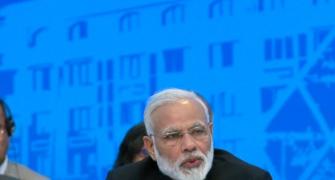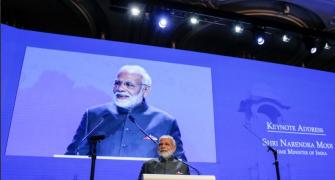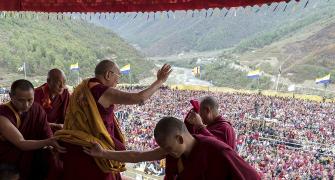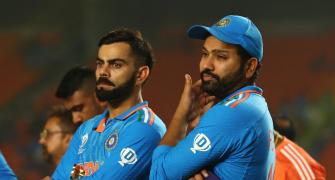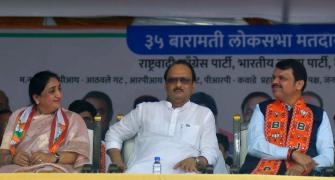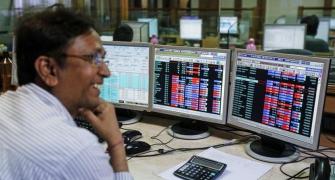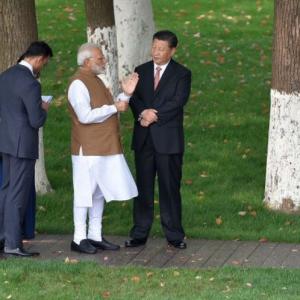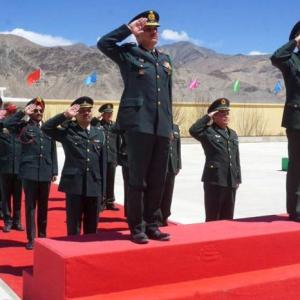'Given the sharp increase in oil prices, a mounting problem for the 2nd and 4th largest importers like China and India -- the Qingdao meeting is likely to push for the large energy producers (Russia and the Central Asian Republics) and energy consumers (China and India) to arrive at some understanding for mutually beneficial outcomes,' notes Srikanth Kondapalli.
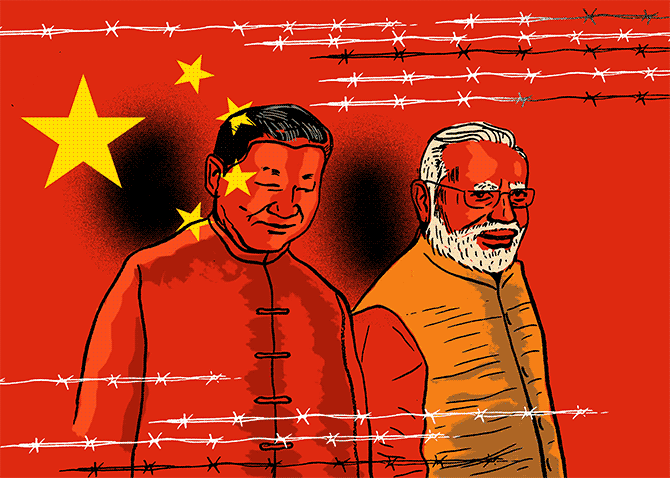
Illustration: Dominic Xavier/Rediff.com
The 18th Shanghai Cooperation Organisation meeting at Qingdao on June 9-10 could turn out to be high in agenda and low in output on pressing issues.
Several new features, of course, will be added to this multilateral process as leaders interact and issue a joint statement.
In the last more than two decades of its existence, from 1996 when it was termed as 'Shanghai Five' and later after Uzbekistan joined in 2001 to form the current SCO, this multilateral organisation came to be known for ushering regional security for the Eurasian region with broad consensus among the leaders on border stability, counter-terrorism, energy security, enhancing economic relations and proposing a multipolar world order.
Despite latent tensions and bickering on South Ossetia, Abkhazia, Crimea and other issues, the SCO progressed.
Today the SCO will be witnessing new changes and challenges.
Firstly, India and Pakistan have become members at the previous year's meeting at Astana in 2017 and now enter Qingdao as full-fledged participants.
They bring in fresh vitality to the SCO given their population and territorial size, national power, economic growth rates, geo-strategic location and vision for long-term development.
While some Chinese commentators deliberately expressed concerns on bilateral problems between India and Pakistan impacting on the multilateral SCO, the actual balance of power in the organisation is gradually shifting with Russia emerging from the shadows.
Secondly, China has been exerting pressure on the SCO States to adopt much of its terminology and practice.
These include statements outlining 'new type of international relations', 'community of common destiny', 'three evils', Belt and Road Initiative and others that have been outlined at the last year's 19th Communist party congress.
Many of these terms remain vague, non-transparent or even double-edged. These will be debated extensively at Qingdao.
As the SCO spirit emphasises a consensus approach among member States, it is likely that progress on including these issues could be slow.
Already, the SCO States -- including India in 2006 -- agreed to oppose China's version of 'three evils' -- separatism, extremism and splittism -- meaning in practice opposing Uighur violence, Taiwan's independence movement, the Dalai Lama's 'splittism' from China.
However, while many SCO member States agreed to the Chinese formulation, many are also disappointed that China's definition of terrorism is more nuanced and China-specific.
In the light of China stalling action on Pakistan-based terrorists at the United Nations's 1267 counter-terrorism committee, the meeting at Qingdao could witness some debate on this.
While India and Pakistan forces will join the annual SCO counter-terror Peace Mission exercises, another round of terrorist strikes in Kashmir will expose the fragility of this cooperation.
Also, at the SCO's 2015 Ufa summit, members agreed to support the BRI, an initiative China announced in 2013 to connect Europe, Asia and Africa both in the continental and maritime domains.
However, while India is the second largest contributor to the Asian Infrastructure Investment Bank -- part financier of the BRI -- it is opposed to both China's construction activity and deployment of 'security guards' in the disputed Kashmir region.
Another aspect that would come in sharp focus is the increasing pressure of China on the other SCO member States to accept its version of 'core interests' -- on Tibet, Taiwan, the South China Sea islands dispute or the Japanese-administered Senkaku islands.
However, China has been reluctant to accept similar 'core interests' of other SCO member States so far. The Qingdao meeting will see some of these debates on diplomatic reciprocities.
Thirdly, given the sharp increase in energy prices from nearly $35 per barrel to over $80 per barrel recently -- a mounting problem for the 2nd and 4th largest importers like China and India -- the Qingdao meeting is likely to push for the large energy producers (Russia and the Central Asian Republics) and energy consumers (China and India) to arrive at some understanding for mutually beneficial outcomes.
So far many of these States are making individual interventions in this regard.
Qingdao is likely to push forward a multilateral process in ameliorating energy security in the coming years.
Fourth, in the backdrop of the United States moving away from the Iranian nuclear deal, this issue is likely to be debated extensively.
With the looming energy prices increase and China and India coming under US pressure in terms of imports from Iran -- as has been the practice previously -- the Qingdao meeting is likely to be more of political pressure on the US.
However, as the French president suggested Russian and Chinese companies are likely to get more contracts in the Iranian market.
Fifthly, given the low growth rates of some SCO States and the emerging economic problems of 'new normal' China, and the slow progress in international trade figures with threats of tariff hikes, the Qingdao meeting is likely to reiterate the globalisation process.
Specifically, India, China and Russia -- in their coordination at the G-20, BRICS and other fora -- are likely to carry the rest of the SCO members for a more vocal stance on this aspect.
Srikanth Kondapalli is Professor in Chinese Studies at Jawaharlal Nehru University.

